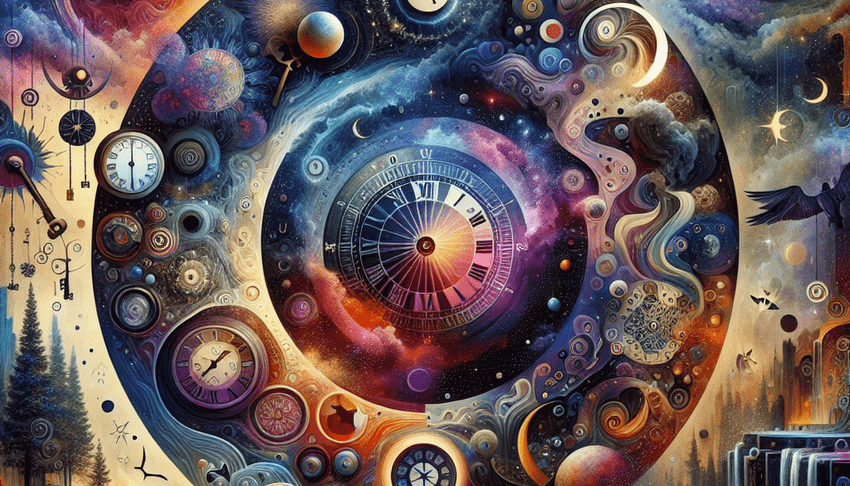Table of Contents
Understanding the Symbolism of Being Lost in Dreams

Psychological Significance of Disorientation Dreams
Dreams of being lost or experiencing disorientation can be particularly disquieting, touching on a primal fear of being out of control. Such dreams often reflect our deepest anxieties and uncertainties in our waking lives. As we explore the psychological significance of disorientation dreams, we unearth connections between our subconscious fears and our conscious experiences.
Subconscious Fears and Insecurities
When we dream of being lost, our minds may be grappling with hidden fears and insecurities. These can range from simple day-to-day worries to profound questions about our purpose and direction in life. Dreams of disorientation often emerge at times of transition or stress, highlighting our inner state of confusion and seeking resolution.
- Individuals transitioning to a new job may dream about wandering aimlessly through unfamiliar corridors, reflecting anxiety about their career path.
- Someone experiencing doubts in a relationship might find themselves lost in an endless forest within their dream, symbolizing a sense of being trapped or uncertain about the future.
Uncertainty and Lack of Direction
The feelings of uncertainty or lack of direction that prompt dreams of being lost are universally relatable. Dream interpretation suggests that such dreams are not just random images; they hold deep symbolic meaning connected to the dreamer’s real-world concerns.
For instance, dreams of being lost in a city can represent the complexity and chaos of everyday life. The dreamer may feel overwhelmed by choices and potential paths, leading to a sense of paralysis and indecision. Such symbolism is a powerful tool for understanding our subconscious and navigating through complex emotions and situations in our awake state.
Symbolism and Real-Life Connections
Breaking down the symbolism in dreams of disorientation, we can often find direct links to real-life challenges. Dream interpretation and symbolism serve as a bridge between our subconscious and conscious minds, providing insight into our emotional well-being.
- An individual with a challenging decision to make might dream of standing at a crossroad, symbolizing the need to choose a direction in life.
- Dreams of being lost in a storm may indicate feelings of being overwhelmed by life’s turmoil and unpredictability.
In conclusion, dreams of being lost or feeling disoriented should not be dismissed as mere figments of the imagination. They are emotionally charged experiences that reflect our psychological state, laden with symbolism that guides us toward self-awareness and growth. Whether it signals career doubt, relationship troubles, or an identity crisis, understanding the phenomenon of disorientation in dreams can be instrumental in resolving the challenges we face when awake.
Cultural and Personal Symbolism of Lost Dreams
Dreams of being lost, whether they manifest as wandering through unfamiliar streets, searching for a missing object, or feeling disoriented in a landscape of confusion, are a universal human experience. These dreams evoke a profound sense of disorientation and anxiety, touching upon fundamental aspects of our psyche. The fascinating interplay between cultural and personal symbolism of such dreams is a rich terrain for exploration in dream interpretation.
Understanding the symbolism of dreams where one feels lost requires delving into the varying cultural tapestries that influence our subconscious narratives. In some cultures, dreams of being lost may reflect societal anxieties, such as the fear of losing one’s identity in the face of modernization or the apprehension surrounding traditional roles in rapidly evolving societies. For example, in a collectivist society where communal harmony is paramount, dreams of being lost might symbolize a fear of estrangement from one’s community or a deviation from societal expectations.
Conversely, in societies that celebrate individualism, the same theme of a disorientation dream could signify personal anxieties about life choices, career paths, or the daunting task of self-actualization. It isn’t just the social fabric that shapes these dreams, but also personal history and experiences. A person who has experienced significant change or trauma might frequently encounter dreams where they are searching for stability or safety amidst chaos.
Real-Life Examples Highlight Diversity
Illustrating the personal aspect, consider a young professional who has recently moved to a new city for work. This individual might dream of being lost in an intricate maze of streets, reflecting their real-life feelings of navigating a new social environment and professional hierarchy. Or think of a retiree experiencing similar dreams; in their case, it might symbolize the search for purpose after a significant life transition.
Moreover, there’s a shared element found across cultures: the evolutionary fear of being separated from the group. Historically, isolation could mean a death sentence, and while modern life has largely mitigated this risk, the primal fear often finds its way into our dreamscapes.
It’s crucial, therefore, in dream interpretation, to consider the individual’s cultural context and personal experiences. A one-size-fits-all approach cannot do justice to the numerous layers of meaning encoded in dreams of being lost. What presents itself as disorientation in the dreamworld could be a subconscious reflection of a quest for direction and belonging in waking life.
In sum, dreams of being lost resonate across cultural boundaries but are interpreted through highly individualized lenses. They signify a journey, internal or external, and our innate human desire to find our place in the world. Dream interpretation, especially concerning such complex and emotionally charged symbols, must therefore be approached with sensitivity to both the common threads that unite us and the individual stories that define us.
Dream Interpretation and Personal Growth

Using Disorientation Dreams for Emotional Intelligence
Dreams of being lost or experiencing disorientation are common experiences that can be vivid and unsettling, invoking a sense of panic or anxiety in the dreamer. However, these dreams can also offer invaluable insights into our subconscious minds, serving as conduits for enhancing Emotional Intelligence (EI). By interpreting these dreams, individuals can tap into a deeper understanding of their emotions, responses, and social interactions.
Understanding the Dreamscape
The terrain of our dreams is often a symbolic representation of our inner lives. Dreams of being lost typically reflect feelings of uncertainty, lack of direction, or a need for reassessment in our waking life. By interpreting these dream landscapes, one can gain clarity on their emotional state and begin to navigate challenges with heightened awareness.
- Exploration of self: Reflecting on the details of a disorientation dream can reveal underlying concerns or areas of one’s life that require attention.
- Emotional indicators: Analysing the emotional response within the dream provides insight into how we might truly feel about a situation, beyond our conscious biases.
- Symbolic guidance: The symbols encountered in these dreams can serve as guides, pointing towards solutions or changes needed in one’s waking life.
Boosting Emotional Intelligence
Emotional Intelligence involves self-awareness, self-management, social awareness, and relationship management. Dreams of being lost can act as a reflective tool, contributing to each aspect of EI:
- Self-awareness: Recognizing recurring themes of disorientation can alert individuals to personal insecurities or decision-making patterns that may need revising.
- Self-management: By understanding the triggers within dreams, one can learn to control real-life emotions and reactions with greater proficiency.
- Social awareness: Disorientation in dreams often involves interactions with others, helping to hone one’s ability to read social cues and understand the emotions of those around them.
- Relationship management: With improved self-awareness and social skills, one can nurture healthier relationships, employing empathy and effective communication.
Practical Steps towards Improvement
Interpreting dreams of being lost and their symbolism is not just an insightful exercise but also a practical approach to enhancing Emotional Intelligence. By keeping a dream journal, learning to recognize patterns, and reflecting on the possible meanings behind dream scenarios, anyone can begin to unlock a wealth of emotional insight.
- Journaling: Write down details of disorientation dreams as soon as possible after waking to capture nuances and emotional responses.
- Pattern recognition: Over time, look for patterns in the dreams that may reflect personal growth areas or blind spots in Emotional Intelligence.
- Meaning analysis: Consider the context of current life events and feelings to interpret the dream’s message, ideally with the help of dream interpretation literature or a professional.
Dream interpretation is both an art and a science, where the dreamer must become adept at deciphering their own unique dream language. By integrating the symbols and emotions from dreams of being lost into our waking understanding, we can foster a more profound Emotional Intelligence. This continuous process leads to enhanced self-knowledge, empathetic interactions, and ultimately, more fulfilling and socially adept living.
Practical Approaches to Working Through Lost Dreams
Dreams of being lost or experiencing disorientation are amongst the most universally reported and striking themes within the realm of dreams. These dreams can evoke a potent mix of emotions, leaving individuals eager for interpretation and understanding upon waking. To embark on the fascinating journey through the landscape of dream interpretation and symbolism, we must first anchor our explorations in scientific rigour and a compassionate approach to the narratives we construct from our nightly visions.
Understanding Dreams of Being Lost
To navigate through dreams of being lost, we must first understand the symbolism. Often, these dreams may reflect our internal state of confusion or a period of transition and change within our waking lives. Disorientation in dreams can symbolize a lack of direction or uncertainty about how to proceed in a particular situation.
- Dreams of being lost in a familiar place might suggest a need to reassess known environments or relationships that are no longer serving us.
- When we dream of being lost in a foreign or unknown locale, this may indicate our mind’s endeavor to cope with new challenges or the expansion of our boundaries.
- If we find ourselves repeatedly lost in dreams, it might hint at an underlying fear of losing control or an aspect of our identity.
Interpreting Dreams and Their Symbolism
Interpreting these dreams requires patience and a degree of self-awareness. While dream dictionaries can provide a starting point, the nuanced meaning of any dream is personal. Symbols within these dreams may vary across different cultures, adding layers of complexity to interpretation.
- Water, for example, may represent emotions, while the act of searching for a path could reflect a search for purpose or clarity.
- Encountering obstacles, like closed doors or mazes, could symbolize internal or external barriers to progress.
- Conversely, finding a guide within a dream can be a powerful symbol of the subconscious offering help or insight.
Practical Approaches to Working Through Lost Dreams
As dreams of being lost or disorientation frequently mirror our emotions and challenges, interpreting these dreams can have profound implications for our personal development. The following practical tips will aid individuals in unravelling the mysteries of their own dreams:
- Maintain a dream journal to record the dreams in as much detail as possible. Note not just the narrative, but also the emotions felt during the dream.
- Identify recurring symbols, themes, or emotions. Patterns in our dreams can offer significant clues about underlying issues or emotions we may not be consciously acknowledging.
- Reflect on how the dream relates to your waking life, looking for parallels in your emotions, thoughts, and experiences.
Real-life examples of individuals who have worked through their dreams of being lost and found not only a resolution to their dream scenarios, but also insights that have facilitated personal growth, showcase the transformative potential of this practice. Dream interpretation of this kind leads to mental resilience, fostering a more profound sense of personal direction and purpose.
Summary
Dreams often provide a window into our subconscious, unveilinginternal fears and insecurities that influence our waking world. When we dream of being lost or disoriented, it’s not merely a fleeting nighttime image; such dreams touch upon a primal fear of being out of control, often reflecting our deepest anxieties in real life.
Subconscious Fears and Real-Life Reflections
Disorientation in dreams can emerge during times of transition or stress, serving as an emblem for our inner state of confusion. For example:
- A person starting a new job might dream of wandering through unknown halls, symbolizing career anxiety.
- Someone questioning their relationship could dream of a bewildering forest, representing uncertainty about the future.
Symbolism and Interpretation
These dreams, filled with rich symbolism, provide a lens through which we can examine our conscious experiences. They help us navigate complex emotions by linking subconscious fears to our challenges and decisions, such as feeling overwhelmed in everyday life or standing at a crossroad in need of making a pivotal choice.
Dreams are not only a personal experience but are also colored by our cultural backdrop. Mythological tales and Jungian archetypes often influence our dream imagery, alluding to collective journeys of transformation and self-discovery. Understanding these cultural narratives can enrich our interpretation of being lost in dreams and draw connections to a shared human experience.
Enhancing Emotional Intelligence through Dreams
Dream interpretation also paves the way for greater Emotional Intelligence (EI) by encouraging us to understand and manage our emotions. By examining the details within these dreams and reflecting on their emotional context, we can gain insights into how we respond to our social environment and improve our relational dynamics. Strategies like maintaining a dream journal and recognizing dream patterns can be instrumental in this journey of self-awareness.
Practical steps such as analyzing recurring symbols, noting emotional responses within the dream, and relating these to your waking life, can reveal underlying concerns or areas of improvement in one’s EI.
By grappling with the complexities of our dreams—identifying symbols, deciphering emotions, and understanding their significance—we not only address the unsettling nature of such dreams but also uncover pathways toward personal growth and self-fulfillment.
Unraveling the Journey
Dreams of being lost, therefore, are not to be taken lightly. They symbolize a universal exploration of our psychological landscapes, beckoning us to understand our paths and the bigger picture of our existence. Through careful interpretation and reflection on our dreams, we can unlock the doors to our own emotional and existential orientation, empowering us to embrace the journey ahead with confidence and clarity.
FAQ – Dreams of Being Lost: What Do They Mean?
What are some possible reasons why dreaming about being lost or disoriented is such a common dream theme among people?
Dreams about being lost or disoriented often reflect our subconscious grappling with life’s uncertainties and the fear of unknown paths ahead. This theme is common because it mirrors the universal challenge of making decisions and the anxiety that comes with potential wrong turns in our waking life. Just as we might feel lost in a new city, our dreams can represent the same sensation in the uncharted territories of our personal growth and experience.
What are some possible explanations for why people often dream about being lost or disoriented?
Dreaming about being lost or disoriented can often reflect feelings of uncertainty or anxiety about one’s path in life, signaling a subconscious grappling with decisions or changes that impact one’s sense of stability. This type of dream could also embody the struggle to find a sense of identity or belonging, where the dreamer navigates the complex maze of personal or professional relationships. In essence, such dreams are a vivid manifestation of the mind’s attempt to process and solve the complexities encountered during waking hours.
What are some possible interpretations of recurring dreams about being lost or disoriented?
Recurring dreams about being lost or disoriented might symbolize an underlying feeling of uncertainty or lack of direction in the dreamer’s waking life, pointing to a quest for purpose or clarity in decision-making. They may also reflect ongoing stress or anxiety about navigating a challenging situation, such as a career change or personal relationships, where the dreamer feels out of control or unable to find a clear path forward. Often, these dreams encourage the individual to confront and address the feelings of confusion that are manifesting in their subconscious.




